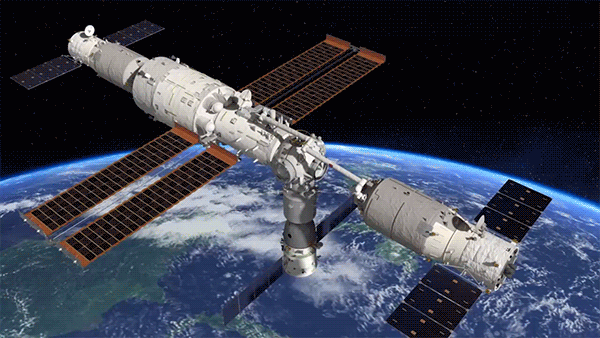China Focus: China's space station to support large-scale scientific research
Xinhua | Updated: 2022-03-18 09:41

by Xinhua writers Liu Yiwei, Yu Fei
BEIJING -- China plans to conduct a number of frontier scientific experiments on its Tiangong space station, with the two laboratory modules, Wentian and Mengtian, scheduled to be launched this year, according to the Technology and Engineering Center for Space Utilization under the Chinese Academy of Sciences.
The experiments include raising fish, growing vegetables, setting up the most precise clocks in space, developing new materials, studying physical laws and exploring how humans can survive in space for long periods.
The scientific experiment facilities to be installed in the two lab modules are currently under development and will be launched into orbit on schedule to support large-scale and multidisciplinary scientific research, said the CSU.
The scientific work will make use of experiment racks that can hold a variety of technical hardware and materials, allowing astronauts to upgrade and replace the facilities over time.
Testing work has begun on the experiment racks that are already installed in the Tianhe core module, which was launched last year, and these will be used for container-free material science and high microgravity experiments, said Zhang Wei, director of the Utilization Development Center of CSU.
Additional experiment racks will be included in the two lab modules, which will support a large number of research projects in fields such as space life, fluids, space materials, fundamental physics and combustion, together with the extravehicular experiment platform, Zhang said.
More than 10 life-science experiments on plants, animals and microbial cells will be carried out in the Wentian lab module, including a small closed ecosystem composed of small fish, microorganisms and algae, according to Zhang.
Scientists are also planning to establish the world's first space-based cold atomic clock system in the Mengtian lab module, consisting of a hydrogen clock, a rubidium clock and an optical clock.
"If successful, the cold atomic clocks will form the most precise time and frequency system in space, which should not lose one second in hundreds of millions of years," said Zhang.
The world's first ever cold atomic clock that operates in space was made by Chinese scientists. It was launched with the Tiangong-2 space lab in 2016, and has a margin of error of less than one second in 30 million years.
Now, in ground-based experiments, Chinese scientists have developed cold atomic clocks that are far more accurate than the Tiangong 2 version, according to Zhang.
The development of space cold atomic clock technology will contribute to higher-precision satellite positioning and navigation, and support fundamental physics research such as dark matter probes and gravitational wave detection, scientists say.
China is conducting long-term and systematic planning for space experiments in four important areas: space life-sciences and human research, microgravity physical science, space astronomy and earth science, and new space technologies and applications, said Gao Ming, director of the CSU and general director of the space application system of China's manned space program, adding that a number of scientific research facilities have been developed to support more than 1,000 in-orbit research projects.
China is also building a ground experiment base in Huairou Science City in the northeastern suburbs of Beijing to provide experimental conditions similar to those of the space station so as to conduct ground verification for the space station program, and to support space-earth comparison experiments, Zhang said.
In addition, China has been active in international space-station cooperation, including working with the European Space Agency on 10 projects.
China also cooperates with the United Nations Office for Outer Space Affairs to solicit scientific research projects on the space station from scientists around the world, and nine projects have been selected.
























